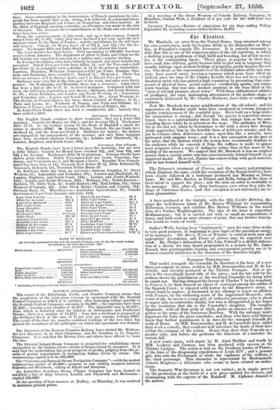PARISIAN THEATRICALS.
That model renegade the Constable De Bourbon is the hero of a new three-act comedy in verse, written by MM. Descourcelles and H. de La- cretelle, and recently produced at the Theatre Francais. Pale ee gee (Foie is the exceedingly moral title of the piece ; and the tale told by the authors shows the punishment of the wretched Constable for doing what he ought not. Having obtained the favour of Charles V by his treachery to Francis I, he finds himself an object of contempt among the nobles of the Spanish Court; is rejected with horror by the Emperor's sister, to whose hand he aspires ; is frustrated in his attempt to renew an alliance with Francis, by the withering scorn of the imprisoned Monarch ; and, worst of all, he meets a young girl, of unknown parentage, who is about to marry into an aristocratic family, but who is disappointedin her hopes by the revelation that she is the Constable's daughter. The haughty Spaniards, with all their pride of birth, prefer an absence of name alto- gether to the name of the traitorous Bourbon. With the unhappy man's departure for Italy the piece concludes ; and those who have read history know that further punishment is in store for the renegade beneath the walls of Rome. As MM. Descourcelles and H. de Lacretelle have called their work a comedy, they could not well introduce the death of their hero within the compass of the action. Hence they show their Nemesis as a picador only, and before she performs the functions of a matador the curtain fall.
A new comic opera, with music by AL Aline Maillart and words by MM. Lockroy and Cormon, has been produced with success at the Theatre Lyrique. The action is laid on the Southern border of France, at the time of the dragooning expeditions of Louis XIV ; and a peasant girl, who aids the Protestants to elude the vigilance of the soldiers, is the chief personage. This character is represented by Mademoiselle Juliette Borghese—a debutante who seems to have created an enthu- siasm.
The dramatic War-literature is not yet extinct ; as is amply proved by the production at the Gaits of a new piece entitled _Les Zonaves, and terminating with the capture of the Malakoff. M. Alphonse Arnault is the author.


























 Previous page
Previous page